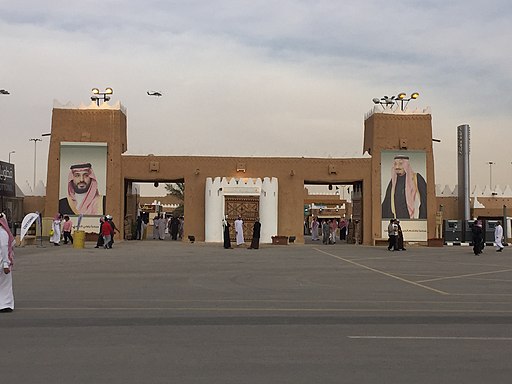What are the Main Differences between Saudi Arabia and the UAE?
Many assume the two Arab Gulf countries are alike.
However, Saudi Arabia and the UAE are culturally, politically and socially different in many ways.
How?
Well, let’s explore three key differences between them.
1. Centralised rather than Federal Power Structures
2. Monocultural versus Multicultural
3. Zero versus Flexible Religious Tolerance
INTERESTED IN ARAB CULTURE?
CHECK THE FREE SAMPLE OF OUR ELEARNING COURSE AT THE END!
1. Centralised rather than Federal Power Structures
Saudi Arabia is under the autocratic rule of the King of the House of Saud. The current King has made his son, Muhammad Bin Salman (aka MBS) the Crown Prince of Saudi Arabia.
Although he’s officially not the King, he wields the power of the King and controls all the economic, social and political functions of the country.
The UAE, on the other hand, is part of a federation of seven states, all of whom have their own ruler or ‘Emir’ (hence the Emir in Emirates).
It is a federal, presidential and constitutional monarchy, which has been established on the back of the mutual cooperation of the individual emirates. Like Saudi Arabia, however, it is undemocratic as all decisions as to leading roles (such as the President and Prime Minister) are made by the Federal Supreme Council. Emiratis do not have a say in their leaders.
Although the Emirs within the UAE are absolute monarchs (as per the power set up in Saudi Arabia), prominent Emiratis are included in regular council meetings to discuss local and federal events, meaning that the UAE is generally considered less autocratic than Saudi Arabia.
Portraits of King Salman bin Abdulaziz and Crown Prince Mohammed bin Salman in Saudi Arabia.
Did you know any criticism of the royal families in most Arab Gulf countries is a criminal offence?
2. Monocultural versus Multicultural
Saudi Arabia is a culturally homogenous country that takes many of its traditions and customs from its deeply rooted beliefs in Islam and its Bedouin heritage.
The UAE, however, is one of the most multicultural countries in the world. In contrast to the cultural homogeneity of Saudi Arabia, only 15% of the UAE population are native Emiratis. The other 85% are expats from across the world (with 20% of this expatriate group coming from India).
The multicultural makeup of the UAE is largely due to its dependence on expatriate labour to support its domestic petroleum, petrochemical, cement and aluminium industries.
The ‘tax free zones’ of the UAE have attracted a diverse portfolio of successful international service businesses which naturally attracts expatriate employees and the country (particularly Dubai) is a ‘go to’ holiday destination which receives regular travel and tourism awards.
Whilst the UAE attracts a large multicultural population, the strict religious interpretations adopted by Saudi Arabia make it a less appealing destination for most international expatriates.
Indians form one of the largest expatriate groups in the UAE constituting 28% of the total population.
Click here to learn more about the society and culture of the UAE.
3. Zero versus Flexible Religious Tolerance
The creation of Saudi Arabia was largely due to a pact between an 18th century, ultraconservative Islamic fundamentalist called Muhammad ibn Abd al Wahhab and a local leader, Muhammad bin Saud. By offering political obedience to Muhammad al Saud, Muhammad al Wahhab, in turn, received guaranteed protection of his religious movement.
To this day, Saudi Arabia follows this same puritanical interpretation of Islam which allows little tolerance of any other religion (or any other interpretation of Islam). This means that there are no churches, synagogues or temples in Saudi Arabia, and, although religious books are tolerated for personal use, gifting a bible to a Saudi national could be interpreted as proselytising, which carries a severe punishment.
The UAE on the other hand is generally very tolerant of other religions. People can practice their faith openly and wear religious clothing and other apparel. The UAE (particularly Dubai), is also home to some beautiful churches and temples and the first synagogue was built in 2019. Although like Saudi Arabia, anyone caught trying to proselytise and convert UAE citizens would be subject to punishment, the country is generally far more relaxed and expatriate staff typically feel safe practising their religion.
This difference in the interpretation of Islam feeds through into the cultural practices of each country. In the UAE Emirati population, for example, females are more likely to work in public services and gender mixing is slightly more relaxed.
Saudi Arabia homes the two holiest sites in Islam, Makkah (above) and Medina, which can only be visited by Muslims.
If you're new to the region it's important to understand the teachings of Islam.
Similar but Different
In summary, it’s fair to say that despite the geographic closeness of Saudi Arabia and the UAE, a shared language and many shared cultural practices, the countries have a number of distinct differences which help shape their individual identities.
Learn more about Arab Culture
If you are looking to do business with either the UAE or Saudi Arabia, then make your venture a success by taking our eLearning course on the Middle East.
You can watch an abridged sample of the course video below or go to the course page for more information.
Main image by Tribes of the World on Flickr (CC BY-SA 2.0)
By accepting you will be accessing a service provided by a third-party external to https://www.commisceo-global.com./

 +44 0330 027 0207 or +1 (818) 532-6908
+44 0330 027 0207 or +1 (818) 532-6908



